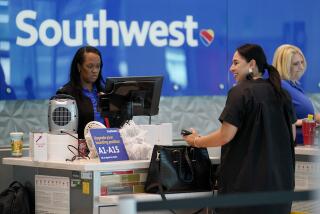Resort towns for less: Save on flights, lodging, car rentals and food
- Share via
You can save money in a resort town the obvious way — by visiting in the shoulder season. But what fun is that?
You probably want to go to Big Bear or Aspen or Vail in Colorado or Bozeman, Mont., or Jackson Hole, Wyo., when everyone else does — in July for fly fishing and hiking or in December or February for skiing and snowboarding.
Going in high season can be a budget bruiser, but it doesn’t have to be a budget breaker. I recently took a relatively inexpensive holiday weekend trip to Bozeman and saved money using many of these tricks.
Flights
When to buy: No matter what you read, there’s no single best time. Sometimes, you’ll save months ahead. Other times, four to six weeks is best. Occasionally, you’ll get lucky last minute. The best idea? Search often and when you see a reasonable fare, grab it. You may never see deep discounts.
Look for nearby airports: Most resort towns have a main airport with expensive high-season fares. Be flexible. Denver and Colorado Springs are decent alternatives to Aspen and Vail. Idaho Falls, Idaho, is an option for Jackson Hole, and Billings works for Bozeman. Some drives are three hours each way, but savings can be substantial, especially when you factor in cheaper rental cars at outlying airports.
Bonus tip: Search for one plane ticket at a time. Sometimes airlines have only one ticket left at the lowest price. If you search for two, and there’s only one cheap fare left, most systems will show you both tickets at the higher price. When we went to Bozeman, my wife and I bought our tickets separately — hers was $483 and mine was $528, so we saved $45.
Rental car: Use Priceline’s Name Your Own Price feature. You bid on a car, and if your bid is accepted, Priceline gives you a reservation at one of six rental companies. Some find Priceline intimidating because they’re not sure what to bid. But it’s easy.
First go to Hotwire.com, a Priceline competitor with a similar model. With Hotwire, there’s no bidding: It gives you an exact per day price. That may sound better, but Hotwire is usually pricier. Use this to your advantage. See what Hotwire charges per day, then return to Priceline and bid $2-$3 less per day. If it doesn’t work, wait 24 hours and bid slightly higher.
In Bozeman, I got a SUV for $26 a day. Priceline said I saved 48% over what I would have paid on Orbitz or Expedia. Just remember that if you have to cancel your trip, you will not get your money back.
Lodging
Hotels: Try Trivago.com, which says it scans nearly 300 websites for the best price. Be sure to experiment with open-ended searches. Tell Trivago you want a four-star resort in Colorado or Wyoming or Utah and it will find the cheapest options statewide.
Rental homes/apartments: You’ll save more renting through Airbnb or VRBO. Airbnb is the hipper option — it skews younger — but the inventory is similar on both sites, so compare them. Sometimes Airbnb and VRBO have the same property at different prices.
In Bozeman, we saved more than $50 on a three-day rental by finding a home on Airbnb and booking it on VRBO. Our host explained the discrepancy by saying Airbnb takes a bigger cut from the landlord.
Final tip: On Airbnb you can save more by renting a room or bed in someone’s home. But if you don’t click with your host, it can be uncomfortable.
Food
Avoid restaurants and bring food.
You might not have most of the kitchen basics in a rental home. If you buy spices, coffee and condiments at the local grocery store — along with meat and vegetables — you’ll lose some savings.
Although you won’t want to bring raw chicken or steak, you can bring staples. If you’re driving, it’s easy. But this strategy also works if you’re flying — even with just carry-on bags.
On our recent trip, we packed carry-ons with spices, bagels, crackers, coffee and even a coffee grinder. We skipped liquids, but you can bring three-ounce mini-containers of olive oil or ketchup. That may seem ridiculous, but it’s less wasteful than buying full bottles and tossing them when you leave.
More to Read
Sign up for The Wild
We’ll help you find the best places to hike, bike and run, as well as the perfect silent spots for meditation and yoga.
You may occasionally receive promotional content from the Los Angeles Times.






